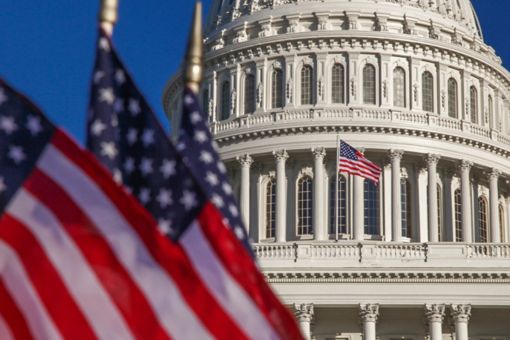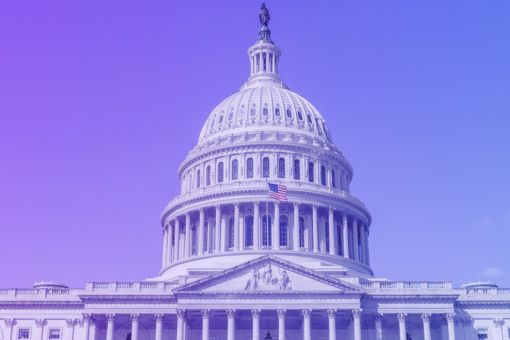Donald Trump took up his second term as US President in January 2025. His credo remains unchanged: "America first". The agenda in the White House is determined by issues that the US government considers to be of central importance to national interests.
Since taking office, the administration has issued numerous presidential decrees (executive orders) and implemented a large number of economic and trade policy measures that also have significant consequences for globally active German companies. The announcement of nationwide import tariffs on "Liberation Day" was particularly drastic.
After a phase of repeatedly postponed transition periods and tariff breaks, a new agreement between the USA and the European Union came into force on August 7, 2025. It provides for a uniform tariff rate of 15 percent for the majority of EU exports to the United States, which applies as an upper limit and may not be combined with other duties. On August 21, both sides published some details on the implementation. Accordingly, US tariffs on automobiles from the EU will be reduced retroactively from the beginning of the month from the previous 27.5 percent to 15 percent as soon as the EU initiates the legislative process for import relief for certain US products. The pharmaceutical industry will also be subject to 15 percent, while steel and aluminum are expected to be subject to 50 percent. At the same time, the European Union is committed to completely abolishing its industrial tariffs, lowering barriers to the import of selected foodstuffs and purchasing large quantities of US energy as well as making additional investments in the United States.
In addition, both sides agreed to reciprocal duty-free treatment for certain products such as aircraft and parts, chemicals, generics and semiconductor equipment. However, points of contention remain, such as wine, spirits and the digital sector, which have so far been excluded from the talks. Furthermore, the joint declaration is not a legally binding agreement, which means that there is still a risk of unilateral action by the US government.
For German companies, this means There is now more clarity and initial limits on additional tariffs, but at the same time political uncertainties and dependencies remain - particularly in the energy sector and in future trade talks. Ultimately, the average effective tariff rate for exports from the EU to the USA is expected to range between 10% and 14% - a significant increase compared to the average of just under 2% before Liberation Day.

What the German economy should prepare for now
What is the new US administration under the presidency of Donald Trump planning - and how should German companies react? Backgrounds, classifications, sectors in focus as well as strategy and action recommendations in compact form.
Download nowAndreas Glunz
Managing Partner International Business
KPMG AG Wirtschaftsprüfungsgesellschaft
Monthly Webcast Series (in German)

Webcast-Live KPMG Briefing : Realignment of the USA, Opportunities and Challenges - with Q&A
Recording from Tuesday, 08 July 2025
Watch webcast recording now
Themenschwerpunkte und Aufzeichnung vom 08.07.2025
- Verabschiedung des One Big Beautiful (Tax) Bills (OBBB) am 4.7.2025: Dauerhafte Festschreibung zahlreicher steuerlicher Regelungen auf dem aktuellen Niveau, Steuererleichterungen für Investitionen in neue Fabriken in den USA, Abschaffung/Auslaufen des Inflation Reduction Acts (IRA), Neue Section 899 (zunächst) gestrichen, Unwägbarkeiten aus Section 891, Inkrafttreten des OBBB
- US-Zölle: voraussichtliche Verlängerung der 90-Tage-Pause vom 9.7.2025 bis zum 1.8.2025, neu geschlossene US-Zollabkommen und Kernpunkte, Indirekte Auswirkungen der Zölle auf China-EU-Zölle, Verhandlungspunkte zwischen USA und EU, Prognose des Verhandlungsergebnisses; Chance für Zolleinsparungen; Automatisierte Zoll-Tarifierungsprüfung mittels KPMG Trade Data Check; KPMG Tariff Simulator für Modellierung Zoll-Zusatzbelastungen, De-Minimis-Regeln, Rechnungs-Split in Haupt- und Nebenleistungen
- Auswirkungen der Zölle auf Finanzberichterstattung: Wertbegründung vs. Wertaufhellung; Stichtage für Jahres- und Zwischenabschlüsse, Relevanz Rechnungslegungsstandards, Prognoserechnungen mit Szenario-Analysen, Auswirkungen auf Prognose Fortführungsprognose, Ansatz und Bewertung von Vermögenswerten, Verbindlichkeiten und Finanzinstrumenten
- US-Steuerreform: „The One Triple B Act”/„The One Big Beautiful Bill Act”; Steuerverschiebung statt Steuerminderungen: keine 15% Corporate Tax Rate; Phase-out Inflation Reduction Act; Retaliatory measures; Section 899; Unfair Foreign countries; Handlungsempfehlungen für deutsche Konzernmütter, US-amerikanische Töchter und Betriebsstätten sowie US-Secondees; BEAT/Mindeststeuer in den USA
- Zölle: Stand der Handelsabkommen UK, China, Indien und EU; Umgang der US-Konzerne mit Zusatzzöllen: „Eat the Tariffs“ vs. Preiserhöhungen und „Pre-tariff Memorial sales“; Handlungsempfehlung Anpassung Transferpreise; „Reconciliation program“ für Zoll-Korrekturen in den USA; Sicherheitsleistungen an Broker
- Befragungsergebnisse deutscher Unternehmen mit Geschäftsaktivitäten in den USA
- US-Zölle: Kategorien von US-Zöllen, Reziprozität der US-Zölle, Auswirkung der bereits gültigen 10% reziproker Zölle, Wahrscheinlichkeit für TTIP 3.0, Kombination verschiedener Zoll-Arten, Zollausnahmen, KPMG Tariff Modeller, USMCA-goods, Zollminderungsstrategien
- Digitalsteuern: Motivation, Diskussionsstand, Anwendungsbereiche, Zeitscheine und Wirkung auch auf deutsche Tech-Unternehmen
- US-Steuerreform: Steuersenkungen vs. Steuererhöhungen für deutsche Unternehmen in den USA, Körperschaftsteuersatzsenkung auf 15%; Tax credits, 50% withholding taxes, Estes Act (BEAT), zeitlicher Fahrplan der Gesetzgebungsverfahren
- US-Zusatzzölle:
- Zoll-Simulationen
- Entfallende Zollrückvergütungen
- Zölle bei Vorerwerbergeschäften
- Produktspezifische Zollaussetzungen
- „Local content“-Vorschriften
- „Completely Knocked down“-Gestaltungen
- Lieferketten:
- Incoterm-Relevanz
- Lagerbestandsaufbau in den USA
- Konsignationsläger in den USA
- Lieferketten-Umbau/“Local sourcing“ in den USA
- Steuerung operativer Prozesse
- Produktionsstätten in den USA
- Verrechnungspreise:
- Relevanz Lieferkettenanpassungen auf Verrechnungspreismodelle
- Zollwertreduktionen
- Exit-Taxation
- Technische Herausforderungen
- Steuergesetzänderungen in den USA:
- Bindungswirkung der „executive orders/actions“
- „Budget reconciliation process“ in USA /Timeline für Gesetzesänderungen
- „Trump´s big beautiful tax bill“
- „Tax cliff“
- Erwartete Steuererhöhungen bei ausländischen Unternehmen
- Digitale Strategien im transatlantischen Korridor:
- Ende des “EU-US Data Privacy Agreements”?
- Cloud-Strategien
- Digitale Resilienz
- Redundanzen
- Nutzung US-AI-Tools (ChatGPT, …) und US-ERP-Solutions in Europa
- Strafzölle vs. Ausgleichszölle
- Verlagerung von Lieferketten und Produktionsstätten
- Lageraufbau in den USA
- Gesetzl. Umsetzung von Zusatzzöllen, betroffene Produkte und Länder
- De-Minimis-Regel
- Mehrwertsteuern als Handelshemmniss
- Ausblick auf Steuergesetzänderungen in USA
- Verschuldungssituation USA
- Tax cliff
- Ausstieg aus globaler Mindestbesteuerung
- neue Quellensteuerabzugsbesteuerung in USA
- Abweichende AI- und ESG-Regeln in USA und Europa
- Zukünftige Nutzung US-amerik. AI-Modelle in Europa
- Relevanz CSRD für US-Gruppen in Deutschland
- Positionierung zu Diversity-, Inclusion- und Equity-Programmen in den USA
The most important questions and answers on the impact of the US realignment on German companies
Donald Trump begins his second term as US President in January 2025. His credo remains "America first". This means that the agenda in the White House will be dominated by issues that Trump believes are fundamental to national interests. The planned realignment of economic policy in Washington could have particularly far-reaching consequences for German companies. What can we expect? What preparatory measures need to be taken now? And how should companies adapt their strategy in order to continue to operate successfully on the US market? We outline the most important details in a compact and precise way.
Donald Trump wants to strengthen the USA as a business location by lowering corporate taxes and making the national or regional market less attractive for imported goods from abroad. Drastic protectionist measures at the expense of long-standing trading partners such as Germany are likely. Trump is also planning to deregulate various sectors, including the energy and financial sectors, and suspend ESG obligations.
15.7 billion euros were invested directly by German companies in the USA in 2023. In the previous year, the figure was 8.2 billion euros. The decisive factor for the increase was the Inflation Reduction Act (IRA), a package of measures from the Biden administration to promote climate-friendly technologies. German companies were very confident about their US business until recently. It is highly questionable what form the IRA will take under Trump.
The support measures announced for the American economy will boost the location. The top tax rate for companies was already reduced from 35 to 21 per cent during Trump's first term in office. He has now held out the prospect of a further reduction to 15 per cent for companies that produce in the USA, while imports will become massively more expensive. At the same time, a more rigid migration policy - also announced - could exacerbate the shortage of skilled labour
Changes or even a suspension of the IRA would slow down the sustainable transformation towards a climate-neutral economy: Subsidies for renewable energies would be cancelled, "green" projects could no longer receive tax breaks. Meanwhile, oil and gas projects will become more lucrative. It is also expected that technology investments will increase significantly, as a number of government restrictions are likely to be removed.
Donald Trump is planning to introduce import tariffs of 10 to 20 per cent across the board, not least because of the consistently high US trade deficit with the EU. Should the EU respond to the new financial hurdles with retaliatory tariffs on US imports, Trump has said that he would immediately follow up: tariffs of more than 100 per cent are even conceivable. This could trigger an escalating race of trade restrictions, which would also damage the USA as a business location.
According to analyst estimates, new US tariffs could lead to an economic downturn of 1 to around 1.5 per cent in Germany. A recession would then be inevitable. It is also possible that US companies will postpone planned investments in Germany or refrain from them altogether as the general conditions on the domestic market improve. Germany is already no longer a prioritised location for US investments in more traditional industries and its relevance could decline once again. However, the situation is different with regard to new business areas that are emerging in Germany in view of the major transformations. Greenfield investments worth billions of euros have recently been made from the USA in data centres, microchip factories and state-of-the-art production facilities for pharmaceutical products.
It is now essential to review export-heavy US business strategies. Business models that are based exclusively on exporting goods to the US, for example, could massively restrict competitiveness in the future. In order to secure access to the US market at competitive prices, it may be necessary to build up local production capacities. The value chain should be further regionalised - but divestments could also become sensible.
China is particularly in Trump's sights. He is accusing the growing superpower of unfair economic policies at the expense of the USA. It cannot be ruled out that Trump will link the maintenance of current trade links between the US and Europe to EU compliance in the fight against Chinese production and export strength. China, on the other hand, is just as important to German companies as the US and abandoning one of the two markets is not an option.
Donald Trump has the means to implement far-reaching measures, as both the US House of Representatives and the US Senate will be under Republican leadership from 2025. He is also better prepared now than when he was first elected. It is therefore conceivable that far-reaching structural changes will be made quickly, which can only be reversed with great difficulty after the end of his second term of office. The redirection of global trade flows that have grown over decades, characterised by a protectionist world view, would have serious long-term consequences for the export-oriented German economy in particular.
How can KPMG help?
Our interdisciplinary teams, consisting of experts from the areas of Trade & Customs, Performance & Strategy and Finance, offer you comprehensive support.
















